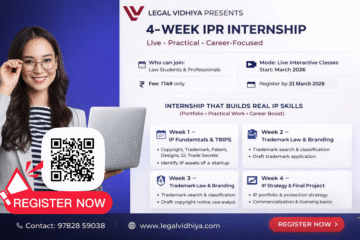
Overview
The West Bengal National University of Juridical Sciences (WBNUJS) is pleased to announce an International Conference on “DATA, KNOWLEDGE, WISDOM & LAW,” scheduled for 9th – 10th November 2024. The International Conference on DATA, KNOWLEDGE, WISDOM & LAW will be a dynamic blend of industry and academia, creating a platform where theoretical research meets practical application.
By integrating perspectives from both sectors, the conference aims to provide a comprehensive understanding of how industry operates in real-world scenarios. Industry professionals will share their experiences and challenges, offering attendees valuable insights into the practicalities and complexities of data management, legal frameworks, and knowledge implementation.
Academic researchers, in turn, can present cutting-edge theories and methodologies, fostering an environment of mutual learning and collaboration. This synergy ensures that participants gain a well-rounded perspective, grounded in both scholarly research and industry realities, ultimately driving innovation and progress in the intersecting fields of data, knowledge, wisdom, and law.
In the modern digital age, the proliferation of data has transformed how knowledge is generated, shared, and utilized. This vast amount of information presents both opportunities and challenges in various fields, including law. The integration of data analytics in legal practices, the role of AI in legal decision-making, and the protection of data privacy are pressing issues that require comprehensive discussion and analysis. Furthermore, the transition from knowledge to wisdom involves ethical considerations that are deeply intertwined with legal principles.
About The West Bengal National University of Juridical Sciences, Kolkata
The West Bengal National University of Juridical Sciences was established under the WBNUJS Act, 1999 (West Bengal Act IX of 1999) adopted by the West Bengal Legislature in July, 1999. The University was notified under Clause (f) of Section 2 of the UGC Act, 1956 in August 2004 and has been granted permanent affiliation by the Bar Council of India in July 2005.
On 28 October 2002, the university’s present-day permanent campus was inaugurated by the then Chief Justice of India, B. N. Kirpal. The NUJS, Kolkata, along with the GNLU and NLSIU, Bengaluru, remain the only three national law schools which have the honourable Chief Justice of India as the Chancellor.
This set-up provides an aura of exclusivity and rare stature to these National Law Schools in India.
About the Centre for Regulatory Studies, Governance and Public Policy
The Centre for Regulatory Studies, Governance and Public Policy (CRSGPP) at the West Bengal National University of Juridical Sciences (WBNUJS), Kolkata was created in July 2015 with the vision of becoming a Centre of Excellence in the field of law, public policy and governance.
Centre for Regulatory Studies, Governance and Public Policy works as a facilitator and foresights a broad vision of making a social change and to create a magnitude of impact through policy planning, research, analysis, training and advocacy in regulatory studies, governance and public policy.
The Centre assists law and policy makers in the preparation and critical evaluation of legislation and policies that have direct bearing on people of the society and have effect on effective governance and administration. It engages in research work on subjects which are at the intersection of law and public policy and to work through empirical or non-empirical methodologies or through a combination of both.
The Centre undertakes research works on functioning of the constitutional and statutory mechanisms for safeguarding and help enhancing the dimension of social welfare. CRSGPP is an engager and manager of various activities such as publishing journals, books, research papers and reports on issues pertaining to law society and governance and strengthen critical public discourses in India.
Finally, CRSGPP acts as a mediator in building ties with social movements, organizations and agencies committed to strengthening democratic ideals and building an inclusive and just society.
About Technology Counsel Foundation
TECOF is an independent, invite-only community platform for technology lawyers, legal services professionals, legal ops professionals, and legal tech developers working in leading technology companies, law firms, and policy-making bodies in India.
Within TECOF’s Specific Interest Groups, members discuss key issues, practical problems, documentation, and experiences in handling day-to-day navigation of legal issues. Through TECOF’s outreach events, engagement with governments, industry bodies, and technologists helps build a broader worldview about the technologies that shape lives and work, and the impact of law on such technologies.
With TECOF’s Legal Tech hub, the organization selects, harnesses, and promotes legal technology development through competitions, strategic investments, and mentorship.
Themes and Sub-Themes
The integration of Data, Knowledge, Wisdom, and Law encompasses a wide array of interdisciplinary topics that can drive rich discussions and insights. Here are additional themes and sub-themes to enhance the scope of the conference:
1. Data Privacy and Security
Sub-Themes:
- Legal frameworks for data protection and privacy.
- Cybersecurity laws and policies.
- Data breaches: Legal consequences and preventive measures.
- The role of encryption and other technologies in safeguarding data.
2. Artificial Intelligence and Machine Learning in Law
Sub-Theme:
- Legal implications of AI in judicial decision-making.
- Ethical considerations in AI deployment in legal practices.
- AI and predictive analytics in law enforcement.
- Regulating AI: Balancing innovation and control.
3. Blockchain Technology and Legal Systems
Sub-Themes:
- Legal status of blockchain and smart contracts.
- Blockchain for transparent and secure legal transactions.
- Decentralized finance (DeFi) and its legal challenges.
- Blockchain in intellectual property rights management.
4. Digital Transformation of Legal Practices
Sub-Themes:
- Digital evidence: Collection, preservation, and admissibility in court.
- E-discovery and electronic litigation.
- Legal technology startups: Innovating the legal industry.
- Remote legal services and virtual law firms.
5. Knowledge Management and Legal Education
Sub-Themes:
- Integrating knowledge management systems in law firms.
- Digital libraries and access to legal resources.
- Legal education in the digital age: Challenges and opportunities.
- Continuous professional development and e-learning for legal professionals.
- E-Discovery and Data Management
6. Ethics and Law in the Digital Age
Sub-Themes:
- Ethical implications of big data analytics.
- The role of ethics in AI and machine learning.
- Balancing individual rights with collective security in the digital realm.
- Ethical hacking and its legal boundaries.
- Predictive Legal Analytics
7. Intellectual Property in the Digital Era
Sub-Themes:
- Protecting digital intellectual property.
- Copyright issues in the age of the internet.
- The impact of digital piracy on creative industries.
- Licensing and digital rights management.
8. Wisdom and Legal Philosophy
Sub-Themes:
- The philosophical foundations of wisdom in law.
- Judicial wisdom: Balancing logic and empathy.
- Wisdom in Digital Rights Management
- Balancing Privacy and Innovation
- The role of wisdom in restorative justice.
- Wisdom in legislative processes and policy-making.
9. Interdisciplinary Approaches to Law and Technology
Sub-Themes:
- Collaboration between technologists and legal professionals.
- Case studies on interdisciplinary solutions to legal problems.
- The role of interdisciplinary research in legal innovation.
- Impact of interdisciplinary education on legal practice.
- Interdisciplinary Research in Law and Data Science
10. Public Policy and Data Governance
Sub-Themes:
- Crafting data governance policies.
- The role of public policy in regulating data-driven technologies.
- Data sovereignty and cross-border data flows.
- Public participation in data governance and policy-making.
11. Healthcare Data and Legal Implications
Sub-Themes:
- Legal frameworks for managing healthcare data.
- Patient privacy and data protection.
- The role of big data in public health law.
- Ethical considerations in the use of health data for research.
12. Financial Technologies (FinTech) and Regulation
Sub-Themes:
- Legal challenges in the FinTech industry.
- Regulating cryptocurrencies and digital assets.
- The role of law in promoting financial inclusion through technology.
- Consumer protection in digital financial services.
13. Environmental Law and Data Analytics
Sub-Themes:
- Using data analytics for environmental monitoring and regulation.
- Legal frameworks for sustainable data practices.
- The role of big data in enforcing environmental laws.
- Predictive analytics for disaster management and environmental protection.
14. Educational Strategies for Law and Technology
Sub-Themes:
- Integrating Technology in Legal Curriculum
- Skill Development for Legal Professionals
- E-Learning and Virtual Classrooms
- Continuous Professional Development
15. Comparative Legal Analysis
Sub-Themes:
- Global Data Protection Laws
- Knowledge Management Practices Worldwide
- Cultural Influences on Legal Wisdom
- International Collaboration in Law
Call for Papers
Undergraduates, Post Graduates, Research Scholars, Academicians and practitioners are invited to submit abstracts and full papers on relevant themes.
Selected papers will be presented during the conference sessions, and outstanding contributions may be considered for publication in a edited book with reputed publisher.
Awards And Recognition
This conference will also feature a special segment dedicated to acknowledging the exceptional contributions of industry professionals. This segment aims to recognize and celebrate the achievements of individuals and organizations that have demonstrated outstanding innovation, leadership, and impact in the fields of data management, knowledge systems, and legal frameworks.
By highlighting these successes, the conference seeks to inspire continued excellence and advancement within the industry. Awards will be presented in various categories.
Panel Discussions with Industry Experts
The conference will host engaging panel discussions featuring prominent industry experts. These sessions aim to delve into current trends, challenges, and innovations in data management, knowledge systems, and legal frameworks.
Panelists will share insights on practical applications, regulatory considerations, and future directions in their respective fields. Attendees can expect lively exchanges and valuable perspectives from leaders shaping the intersection of industry practices and academic research.
These discussions provide a platform for deepening understanding and fostering dialogue on critical issues impacting the broader landscape of data, knowledge, wisdom, and law.
The Conference Has Following Tracks
- Research paper
- Industry Panel Discussion
- Two Day Workshop on Privacy Program Management will be delivered by privacy experts from multi-national SAAS companies
- Tech Showcase
- Keynote Speech
Important Dates
- Last date of Abstract submission: 15th August
- Intimation of selection of abstracts: 20th August
- Last date of Registration: 25th Aug
- Last date of Full paper submission: 30th September
- Date of Conference: 9th – 10th November, 2024
Submission- Details and Guidelines
- Only one submission is allowed per author.
- Co-authorship to a maximum of three authors is permitted. In the case of co-authors, a separate registration form shall be sent for each.
- Only original papers will be considered for the conference. No part of it should have been published earlier anywhere else, nor should it be under consideration for publication or a contest elsewhere.
- Any form of plagiarism will result in disqualification.
- Identification mark of the author, or the affiliated institution (if any) should not be found in any part of the essay.
- Abstracts of not more than 300 words, for original research papers on the above-mentioned themes are invited, submitted as Word document, with a brief bio of 200 words along with one photograph.
- The full-length research paper should be within 8000 words (including footnotes).
- Potential contributors are required to adhere to a uniform mode of citation (20th edition of The Bluebook: A Uniform System of Citation is recommended).
- All abstracts/papers must be written in Times New Roman with font size 12 with 1.5 line spacing. Footnote font size 10 without spacing.
Registration Fees
| Designation | Registration Fee |
| Students | Rs. 2500/- |
| Research Scholars | Rs. 3500/- |
| Academicians | Rs. 4000/- |
| Professionals | Rs. 4500/- |
| Foreign Delegates | Rs. 6680/- |
| Online Paper Presenters | Rs. 5000/- |
| Two Day Workshop | Rs. 5000/- |
How to Register?
Interested participants can register using the links provided at the end of this post.
Contact
- For any collaborations to be an industry partner, please mail to crsgpp@nujs.edu
- For any query, please mail to crsgpp@nujs.edu




0 Comments